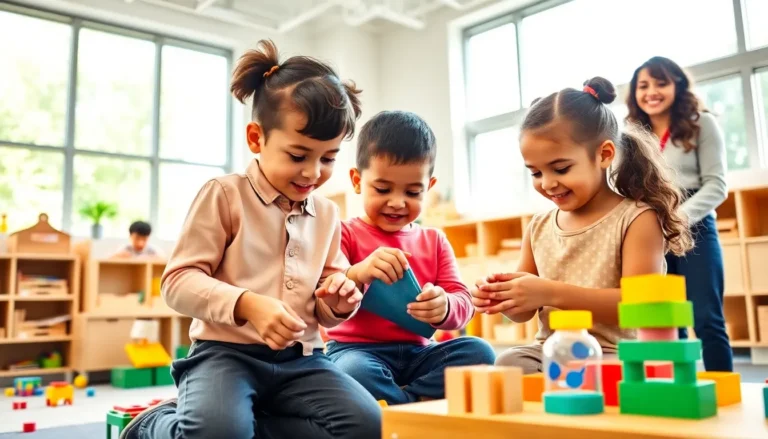As high school graduation approaches, the excitement of college looms large, but so does the question: Are students truly ready? College readiness isn’t just about acing standardized tests or having a killer GPA. It’s about preparing for a world where ramen noodles become a food group and laundry becomes a game of “what’s that smell?”
Table of Contents
ToggleUnderstanding College Readiness
College readiness entails more than just academic success in high school. It requires students to prepare for various aspects of college life.
Definition of College Readiness
College readiness refers to the ability of students to succeed in their post-secondary education. This concept encompasses essential academic skills such as critical thinking, writing, and problem-solving. Additionally, personal readiness plays a significant role, including time management, financial literacy, and self-advocacy skills. Students who demonstrate readiness exhibit a balance between academic knowledge and practical life skills necessary for navigating campus life.
Importance of College Readiness
College readiness holds immense importance for students transitioning from high school. Research indicates that students who are prepared engage more successfully in their coursework. Enhanced preparedness leads to higher retention rates and improved graduation outcomes. Additionally, being ready for college contributes to a smoother adjustment to independent living. With solid preparation, students manage financial responsibilities, access campus resources, and maintain a healthy work-life balance more effectively. Such readiness equips them to face academic challenges and personal growth opportunities, promoting overall success.
Factors Influencing College Readiness

Various factors play a significant role in determining college readiness, focusing both on academic and personal development.
Academic Preparation
Academic preparation forms the foundation of college readiness, encompassing skills and knowledge acquired during high school. Core subjects like mathematics, science, and literature must be mastered to succeed in higher education. Advanced coursework, such as AP or IB classes, can enhance critical thinking abilities and deepen understanding. Regular engagement with challenging assignments promotes intellectual curiosity. Moreover, cultivating study habits and time management skills is crucial for navigating the demanding college workload. Students must also develop proficiency in writing and research, as these skills are vital for producing high-quality academic work. Adequate preparation not only strengthens students’ academic competence but also boosts their confidence in a college environment.
Social and Emotional Skills
Social and emotional skills significantly influence college readiness, enabling students to thrive in diverse settings. Strong communication abilities help students build relationships with peers and professors. Stress management techniques empower them to cope with the pressures of college life. Resilience remains essential for overcoming challenges and setbacks common in higher education. Furthermore, self-advocacy allows students to seek help and navigate resources effectively. Interpersonal skills foster teamwork and collaboration, which are often required in group projects and discussions. Emotional intelligence aids in understanding and empathizing with others, creating a supportive campus community. Students equipped with these skills tend to adapt more easily to the social dynamics of college.
Assessing College Readiness
Assessing college readiness involves evaluating both academic performance and essential life skills. Students must demonstrate proficiency in core areas to succeed.
Standardized Tests
Standardized tests measure students’ knowledge and skills in various subjects. High scores often correlate with readiness for college-level coursework. While not the only factor, these tests provide insight into students’ understanding of critical concepts. Many colleges consider scores as part of their admissions process, alongside other indicators. Preparing for these tests enhances students’ confidence and test-taking strategies. Familiarity with the format and content leads to better performance.
High School Transcripts
High school transcripts reflect students’ academic achievements throughout their education. Grades in core subjects reveal areas of strength and those needing improvement. Additionally, involvement in advanced coursework highlights a student’s commitment to challenging material. AP or IB courses signal a readiness for college-level demands. Colleges review transcripts to assess GPA, course rigor, and overall academic trajectory. Thus, maintaining strong grades consistently is essential for college admissions. Overall, transcripts provide a comprehensive picture of students’ academic journeys.
Strategies to Improve College Readiness
Enhancing college readiness requires a multi-faceted approach. Various strategies focus on boosting both academic skills and personal development.
Academic Interventions
Academic interventions provide targeted support for students struggling to meet college readiness standards. Implementing tutoring programs strengthens understanding in core subjects. Incorporating individualized learning plans helps tailor instruction to specific student needs. Engaging in dual enrollment courses offers high school students college credit while developing skills needed for success. Furthermore, schools can establish mentoring programs, pairing students with upperclassmen or college students for guidance. These interventions increase confidence, improve academic performance, and foster essential skills for thriving in college.
Extracurricular Activities
Extracurricular activities contribute significantly to college readiness by promoting personal growth and social skills. Participation in clubs and organizations fosters teamwork and leadership abilities. Students involved in community service develop empathy and social awareness, essential for interpersonal relationships in college. Engaging in sports not only builds physical fitness but also teaches discipline and time management. Additionally, artistic endeavors like theater or music enhance creativity and self-expression. These activities enrich students’ resumes, highlighting well-roundedness, which many colleges appreciate in applicants.
Preparing for college is a multifaceted journey that extends beyond academics. Students must cultivate a blend of essential skills that encompass both academic proficiency and personal development. Mastery of critical thinking and writing is vital but so is the ability to manage time and finances effectively.
The transition to college life can be challenging but those equipped with the right tools and experiences are more likely to thrive. Engaging in meaningful extracurricular activities and seeking support through tutoring or mentoring can significantly enhance readiness.
Ultimately, fostering a well-rounded skill set paves the way for success in higher education and beyond, ensuring students are ready to tackle the demands of college and independent living.




